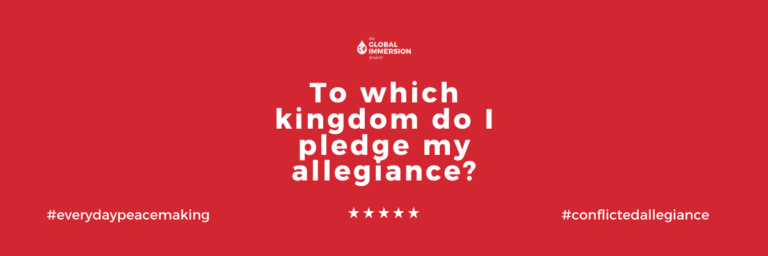Friends,
It goes without saying that we are living through precarious and historic times.
2020 began with a global pandemic that has now taken so much sacred life and disrupted the health and livelihood of so many others. Even as we’ve experienced unifying moments of solidarity, there is a growing chorus of partisan talking points that are being used to politicize what should be a shared struggle.
Everyday Peacemakers are stepping into these hard conversations with generosity and understanding.
Then, we had another tragic series of black people being murdered at the hands of law enforcement. The cries of 400 years of grief, exploitation and trauma have entered the streets and public square in ways reminiscent of the Civil Rights era. Simultaneously, some white leaders and pastors are digging in their heals to maintain systems of White Supremacy while others are following the Spirit on the courageous and long-overdue journey toward healing and collective restoration.
Everyday Peacemaking are stepping onto the streets and into pulpits to disrupt the pseudo “peace” for the sake of God’s liberating and restorative peace.
And now, we are on the eve of “Independence Day” while so many of our sisters, brothers, neighbors and fellow United States citizens are on the streets praying, pleading and lamenting the fact that many of us are still not free. Their cries echo the lamentations of the People of God in our Hebrew Scriptures pleading for God’s deliverance from the systems of occupation and oppression. These cries parallel the urgent lament of Frederick Douglass when speaking to white folks about “Independence Day” in 1852:
“Your high independence only reveals the immeasurable distance between us. The blessings in which you, this day, rejoice, are not enjoyed in common. The rich inheritance of justice, liberty, prosperity and independence, bequeathed by your fathers, is shared by you, not by me. The sunlight that brought light and healing to you, has brought stripes and death to me. This Fourth July is yours, not mine. You may rejoice, I must mourn…”
What does it look like for Everyday Peacemakers to celebrate the 4th of July when, as followers of Jesus, our primary allegiance is to the kingdom of God? This question forces us to ask a second important discipleship question: “To which kingdom do I pledge my allegiance?”
As the cries of those on the underside of power grow louder (or we just begin to hear the cries that have been there all along), Everyday Peacemakers are to be on the front lines of systemic restoration engaging the political institutions of the nation-state. Peace isn’t only about relational restoration, it’s also about societal restoration. The good news of the kingdom of God announced BOTH personal and social restoration. Moments like these expose deeply embedded systemic brokenness and the need for it’s dismantling to resurrect something new.
The answer to the above question is clear: our allegiance is pledged only to the kingdom of God and the Jesus who embodies it. But, that is not an excuse for apathetic withdrawal from engaging the systems and structures as Everyday Peacemakers. Although citizens of the kingdom, we must also leverage our influence as United States citizens on behalf of those on the underside of power and, as part of a democracy, we (thankfully!) have that option.
In doing so, this Fourth of July, we must embrace a Conflicted Allegiance. A conflicted allegiance liberates us to unapologetically give our lives to the values of the kingdom of God, while continually discerning our constructive engagement, support and participation in the United States. A conflicted allegiance reminds us that the Church is meant to be the soul, not the surrogate of the State.
It means we stand with and care for the people fleeing violence on our border AND we leverage our influence in the United States to help fix the broken systems that’s keeping them from finding refuge.
It means we look our neighbors on the streets in the eye to honor their humanity AND we stand in city council meetings advocating for systems to support their healing.
It means we stand in solidarity with our Black and Indigenous friends AND we vote for policy that upends institutionalized racism.
This stuff isn’t easy, but it’s the necessary way to find and follow Jesus in the midst of living in a culture so partisan, political and polarized.
On July 4th, we will celebrate and live a Conflicted Allegiance.
Will you join us?
 Jon Huckins – Co-Founding Director of The Global Immersion Project
Jon Huckins – Co-Founding Director of The Global Immersion Project
Jon is the Co-Founding Director of The Global Immersion Project; a peacemaking training organization helping individuals and communities move toward conflict equipped to heal rather than to win. He writes for numerous publications including USAToday, Red Letter Christians, Sojourners, and RELEVANT, and has written two books of his own; his latest being Thin Places: Six Postures for Creating and Practicing Missional Community. His upcoming book, Mending the Divides: Creative Love in a Conflicted World, releases September 2017. Jon has a master’s degree from Fuller Theological Seminary in theology and ethics. He lives in San Diego with his wife, Jan, three daughters (Ruby, Rosie & Lou) and one son (Hank) where they co-lead an intentional Christian community seeking to live as a reconciling presence in their neighborhood of Golden Hill.
Connect with him on Twitter, Instagram or his personal blog jonhuckins.net

